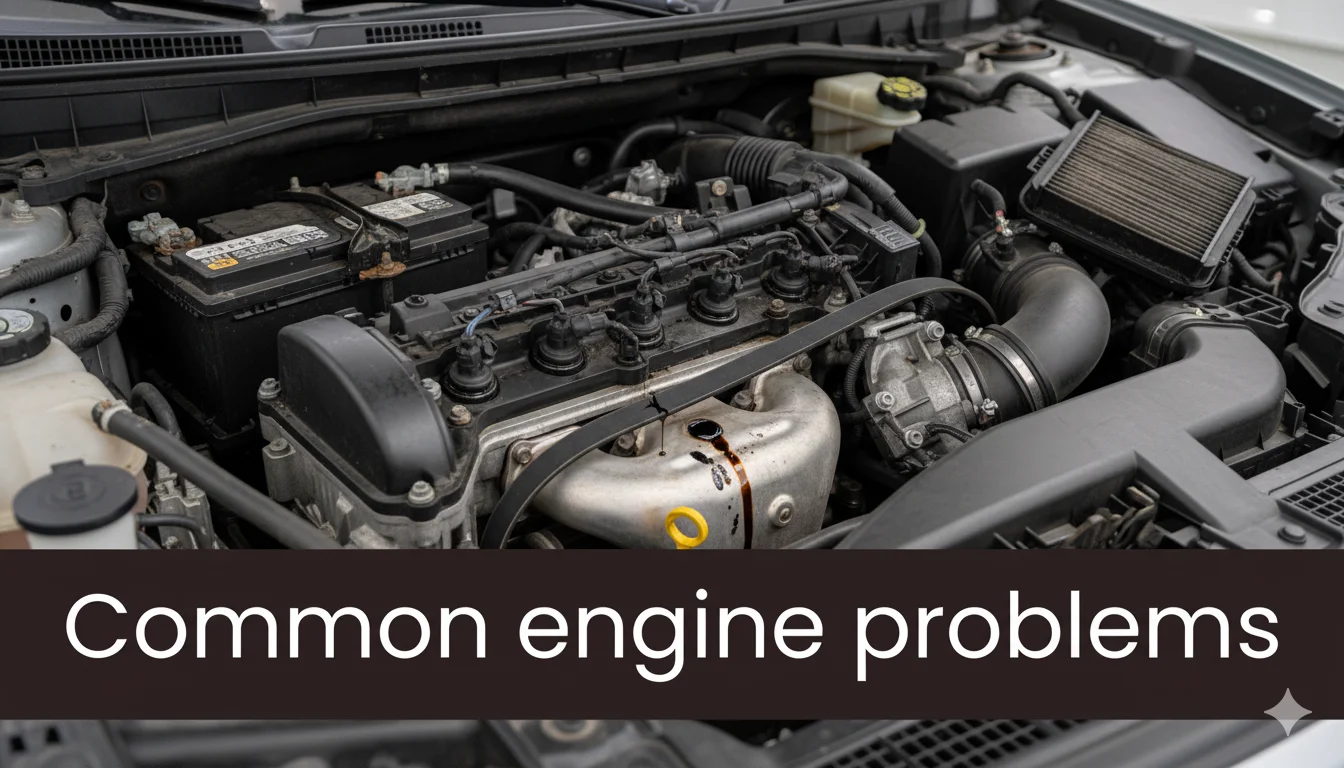Every car owner knows that gut-punch feeling when something doesn’t sound or feel right under the hood. I’ve been there too , hearing a strange knock or noticing your car just isn’t pulling like it used to. Most of us either ignore it or hope it goes away on its own. But here’s the truth: catching engine problems early can save you from a massive repair bill later on. I’ve seen it firsthand, both with my own car and helping out friends who waited too long.
This blog will break down the most common engine problems, the early warning signs you should never ignore, and how you can take simple steps to avoid costly breakdowns.
Common Engine Problems and How to Catch Them Early
Most engine issues start small, a bit of rough idling, a check engine light, or strange smells. But left unchecked, they can turn into serious problems. Recognizing these early symptoms and knowing what causes them can keep your car running strong and safe.
What Are the Most Common Engine Problems?
When it comes to engine trouble, certain problems show up again and again, whether your vehicle is brand new or has been on the road for years. Let me walk you through the key ones, what they mean, and how they often sneak up on you.
1. Engine Misfiring
Misfiring is when the engine stumbles or skips during ignition. It feels like the car jerks slightly when accelerating, or it may idle roughly at a stop. This usually happens due to worn spark plugs, faulty ignition coils, or fuel delivery problems.
Personal story: I remember once my old sedan started shaking every time I idled at a red light. It felt like it was gasping for air. I ignored it for weeks, thinking it was just “old car stuff.” Turned out, two spark plugs were shot, and one ignition coil was failing. Had I checked earlier, I would’ve paid $80 for new plugs; instead, I ended up replacing coils too for over $300.
2. Overheating & Cooling System Failures
Your engine generates a lot of heat, and if your coolant system isn’t doing its job, temperatures rise fast. Causes range from low coolant, thermostat failure to a leaking radiator. An overheating engine can warp parts like the cylinder head or crack your engine block.
Early signs: Temperature gauge climbing high, steam from under the hood, or the smell of burnt coolant.
3. Oil Leaks & Lubrication Issues
Oil is your engine’s lifeblood. If it’s leaking or running low, the parts grind together, leading to internal damage. Oil gasket failures, cracked pans, or worn seals are common culprits.
Look out for: dark puddles under your car, burnt oil smell, or the oil light flickering on the dashboard.
4. Sensor & Ignition Failures
Modern engines rely heavily on oxygen sensors, mass airflow sensors, and ignition modules. If any of these fail, your car may struggle to start, run inefficiently, or consume too much fuel.
Symptoms include: poor mileage, hesitation when accelerating, and that dreaded check engine light.
5. Belt and Hose Breakdowns
Timing belts, serpentine belts, and radiator hoses are rubber components that crack, dry out, or loosen with time. A snapped belt can leave you stranded instantly.
Signs you can catch early: squealing noises, visible cracks, or loss of power steering or air conditioning (serpentine belt related).
Every engine issue listed above is something you can catch early if you’re paying attention. In the next section, we’ll talk about how to spot those warning signs before they leave you stuck on the side of the road.
How to Recognize Warning Signs Early
Engine problems rarely come out of nowhere. Most of the time, your car will try to tell you something’s wrong; you just have to know how to listen. It could be a sound, a smell, a light on the dashboard, or just a weird feeling in how your car is driving. Picking up on these early clues can save you from major repairs and keep you safe on the road.
Unusual Noises You Should Never Ignore
If your engine starts making noises that weren’t there before, that’s your first big clue. A knocking sound under the hood when you accelerate often means there’s an issue with the way the fuel is igniting. It could be due to carbon build-up, poor fuel quality, or even a timing problem. A rattling noise might be something as simple as a loose heat shield, or it could mean parts inside the engine are wearing out and need attention.
Sometimes people wait, hoping the sound will just disappear. But I’ve seen many engines ruined because a minor noise turned into a full-blown mechanical failure. If something sounds off, it probably is.
A Drop in Performance or Fuel Efficiency
You know how your car is supposed to feel when you press the gas pedal. If it suddenly feels sluggish, stutters when accelerating, or struggles to maintain speed, that’s your engine trying to tell you something. Often, this is related to clogged air filters, failing spark plugs, or a malfunctioning fuel injector.
Another sign is if you’re filling up the tank more often than usual. Poor fuel economy often means the engine is burning more gas than it should, which points to internal inefficiencies. Addressing these issues early not only saves your engine but also keeps your fuel bills down.
Warning Lights on the Dashboard
The Check Engine Light isn’t just a suggestion; it’s your car saying, “Hey, we’ve got a problem.” Sometimes it lights up for small issues like a loose gas cap, but it can also mean misfires, sensor failures, or exhaust system problems.
Modern vehicles have sensors throughout the engine, constantly monitoring performance. When something falls out of range, the light comes on. A common mistake I see is drivers ignoring it because the car still “runs fine.” But while it’s running, damage might still be happening in the background. Getting the car scanned with a diagnostic tool is quick and often free at local shops.
Smoke or Unusual Smells
Any kind of smoke coming from your exhaust is a sign to investigate. Blue smoke means the engine is burning oil. White smoke can mean coolant is leaking into the combustion chamber. Black smoke indicates too much fuel is being burned.
You might also notice strange smells inside the cabin, a sweet odor can mean leaking coolant, a burnt oil smell points to a leak near hot engine parts, and a rotten egg smell often means a failing catalytic converter. These might seem like minor annoyances, but they often hint at bigger problems just around the corner.
Overheating and Temperature Spikes
Engines are designed to run hot, but only within a safe temperature range. If your temperature gauge creeps into the red or if you see steam coming from the hood, stop the car immediately. Overheating is one of the most dangerous things that can happen to your engine, often caused by low coolant, a stuck thermostat, or a faulty radiator fan.
Even short-term overheating can lead to a warped cylinder head or blown head gasket, both of which are expensive to fix. If the gauge climbs even once, it’s a warning you can’t afford to ignore.
By paying attention to these early signs, you can catch most engine problems while they’re still small and manageable. In the next section, I’ll break down what actually causes these problems in the first place, so you can understand how to keep them from happening again.
Why These Problems Happen: Root Causes Explained
Understanding why engine problems happen is just as important as spotting the early signs. Most issues don’t come out of nowhere; they build up over time due to poor maintenance, worn-out parts, or hidden issues. Let’s break down the most common causes so you can stay ahead of them.
Lack of Regular Maintenance
According to the U.S. Environmental Protection Agency (EPA), failure to maintain engine and emission systems properly increases the risk of mobile‑source pollutants and engine damage. This is by far the biggest reason engines start acting up. When you skip oil changes, forget about air filters, or put off spark plug replacements, small issues begin to pile up. Over time, dirty oil, clogged filters, or old spark plugs can reduce performance and lead to much bigger failures.
- Skipping oil changes thickens oil and clogs the system
- Ignoring spark plugs causes misfiring and hard starts
- Old air filters choke airflow, causing power loss
Wear and Tear on Engine Components
Engines work hard; every time you drive, thousands of small parts are in motion. Naturally, parts like belts, hoses, gaskets, and seals wear down. If not replaced in time, they can leak, snap, or break under pressure.
- Timing belts often fail without warning if not replaced as scheduled
- Rubber hoses crack from heat exposure over time
- Gaskets and seals become brittle, leading to leaks
Failing Sensors and Electronics
Modern engines rely on sensors to control fuel, air, and spark delivery. If one sensor gives a wrong reading, it throws everything off. Many drivers don’t realize that a simple oxygen sensor failure can cause poor mileage and damage the catalytic converter.
- Oxygen sensors misreading the air-fuel ratio leads to engine strain
- Mass airflow sensor issues can make the car hesitate or stall
- Faulty temperature sensors may not warn you of overheating
Environmental and Driving Conditions
Where and how you drive matters more than you think. Stop-and-go traffic, long idling, or heavy towing put extra load on the engine. Driving in extreme heat or cold without regular checks wears down components faster.
Here’s a simple table to show you how each cause leads to a bigger issue:
| Root Cause | Common Result | What You Can Do |
| Skipped oil changes | Engine overheating, damage | Change oil every 5,000-7,500 mi |
| Worn spark plugs | Misfires, poor mileage | Replace every 30k-100k miles |
| Cracked hoses or belts | Leaks, overheating, breakdowns | Inspect every service visit |
| Failing sensors | Poor performance, high fuel use | Scan codes, replace faulty sensors |
| Harsh driving conditions | Faster wear on parts | Check fluids, inspect engine monthly |
By knowing what’s causing the trouble, you can prevent many engine problems before they even start. Up next, I’ll walk you through real steps you can take to stay ahead of these issues with smart maintenance.
Preventive Maintenance: What You Should Do

The best way to avoid engine trouble is to stop it before it starts. Preventive maintenance isn’t just about following rules; it’s about protecting your engine and your wallet. I’ve seen drivers go years without serious issues just because they kept up with a simple routine. Let’s look at what you should focus on to keep your engine healthy and running smoothly.
Follow a Regular Service Schedule
Even if your car feels fine, it still needs attention. Basic engine maintenance should happen every 5,000 to 12,000 miles, depending on your vehicle and driving habits.
- Get an oil and filter change every 5,000 to 7,500 miles
- Replace spark plugs around 30,000 to 100,000 miles, depending on the type
- Schedule a full inspection every 12,000 miles or once a year
These steps might feel small, but they make a big difference in engine lifespan.
Don’t Ignore the “Check Engine” Light
That warning light is your car’s way of asking for help. A small issue like a loose gas cap is easy to fix, but sometimes the light means something deeper, like a failing catalytic converter or misfiring cylinder.
- Use a diagnostic scanner to check error codes
- Address sensor issues early before they snowball
- If unsure, have a trusted mechanic take a look
Catching the cause early can prevent a small fix from turning into a costly repair.
Keep Fluids and Filters in Check
Engine oil isn’t the only fluid that matters. Coolant, transmission fluid, and brake fluid all support your engine’s performance. Low or dirty fluids cause parts to wear faster.
- Check coolant levels monthly and flush them every 2 to 3 years
- Change air filters every 15,000 to 30,000 miles
- Inspect for oil leaks or burning smells during routine checks
Dirty filters restrict airflow, which causes your engine to work harder than it should.
Inspect Belts, Hoses, and Battery Regularly
These parts often get overlooked until they break, and when they do, it usually leads to breakdowns.
- Check belts for cracks, fraying, or squealing noises
- Inspect radiator and heater hoses for bulges or leaks
- Test your battery every 6 months, especially before winter
Keeping an eye on these items means fewer surprises on the road.
Sticking to these maintenance habits takes only a little time but goes a long way toward preventing the most common engine problems. In the next section, I’ll share how to tell when it’s time to stop guessing and bring your car to a professional.
When to Bring Your Car to a Professional
Sometimes, even with your best efforts, engine problems can still sneak up on you. And while routine maintenance can prevent most issues, there comes a point when it’s smarter and safer to let a professional take over. Knowing when to bring your car to a mechanic can be the difference between a quick fix and a major repair job.
Persistent Warning Signs You Can’t Ignore
If you’ve noticed repeated symptoms like engine stalling, rough idling, or poor fuel economy despite replacing filters or spark plugs, it’s time to stop guessing. These kinds of problems often point to deeper issues like fuel injector trouble, a failing sensor, or compression loss inside the engine. If the Check Engine Light stays on or comes back frequently after being reset, that’s another sign the problem is beyond basic DIY fixes.
Diagnostic Tools Do More Than You Think
Professional repair shops use advanced diagnostic tools that go far beyond the basic scanners most people buy online. These tools can read specific sensor outputs, perform live engine tests, and even measure engine timing. Mechanics can quickly tell whether a sensor is failing, if your engine is misfiring under load, or if there’s a deeper electrical or mechanical fault. It saves time and removes the guesswork.
When Repairs Get Risky or Complicated
There’s a point where attempting a fix yourself could cause more harm than good. Replacing a spark plug or changing oil is simple enough, but trying to adjust timing belts, remove cylinder heads, or work around electronic engine control units without the right knowledge can backfire. Mistakes can lead to more damage or even make the car unsafe to drive.
If you’ve never replaced a timing belt, tested a coil pack, or reset an ECU, that’s okay , that’s what professionals are for. Skilled mechanics have the tools and experience to make repairs correctly the first time, and they often offer warranties on their work. That peace of mind is worth it.
Final Thoughts
Engine problems can feel intimidating, but most start with small, fixable signs. If you stay alert to those early warnings, keep up with simple maintenance, and don’t hesitate to ask for professional help when needed, you’ll avoid costly breakdowns and keep your car running strong. Taking care of your engine isn’t just about saving money; it’s about peace of mind every time you hit the road.
Need help with your engine? Don’t wait for a small issue to turn into a major repair. If you’re near Huntsville, bring your vehicle to the trusted team at Brian’s Tire & Service. Whether it’s diagnostics, maintenance, or a full engine check, they’ll get you back on the road safely and affordably.
Trusting a Shop That Communicates Clearly
A good mechanic doesn’t just fix your car; they explain what went wrong and why. When you visit a professional shop, you should leave with a clear idea of what was done, what parts were replaced, and how to avoid similar issues in the future. That kind of transparency builds trust and keeps your engine and your wallet in good shape.


